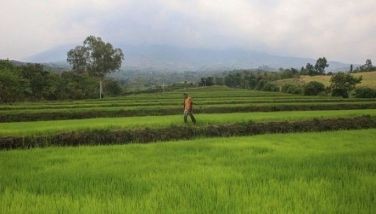Yearender: Melamine scare keeps DOH busy
The Department of Health (DOH) had a good but difficult year in 2008.
While it enjoyed a high level of public awareness and satisfaction ratings in Social Weather Stations (SWS) and Pulse Asia surveys, its hands were full attending to victims of calamities and armed conflicts, keeping contaminated milk out of the country, and preventing the Ebola Reston virus from affecting humans.
As the year ends, the DOH is recognized as among the top performing agencies of the government, with DOH Secretary Francisco Duque III getting a high public satisfaction rating.
In SWS 3rd Quarter Survey, Duque ranked No. 1 among Cabinet members, with 41 percent satisfaction rating. The DOH satisfaction rating also went up by five percent, from 64 percent in June survey to 69 percent in September 2008.
This year, the DOH also led efforts in helping Mindanao residents caught in battlefields last August after renegade Moro Islamic Liberation Front (MILF) rebels attacked villages in North Cotabato, South Cotabato, Lanao del Sur, Lanao del Norte, Sarangani, Sultan Kudarat, Basilan, Shariff Kabunsuan, and Maguindanao.
President Arroyo assigned the DOH to head the Task Force Humanitarian Assistance at the height of the armed conflict between government troops and rebels.
The agency also assisted victims of typhoons like “Frank,” “Nina” and “Cosme” that hit the country this year.
The DOH also attended to victims of outbreaks of cholera in several barangays in Calamba, Laguna and Tagoloan, Misamis Oriental; typhoid fever in Real, Quezon; and dengue in San Mateo, Rizal, among others.
Duque attributed the shifting pattern of the rainy season brought about by the climate change to the increasing cases of dengue, cholera, malaria and typhoid fever.
But the DOH scored a victory when Republic Act 9502 or the Universally Accessible Cheaper and Quality Medicines Act of 2008 was signed into law in June.
Though some consumers and patients’ groups believed that the law is insufficient without a provision for the creation of a price regulatory board, the DOH is confident that it will achieve its purpose of giving ordinary Filipinos affordable but quality medicines.
The law strengthens the generic industry by authorizing the government to issue compulsory licenses to other companies to produce domestic medicines for local use.
It also grants the government and any accredited third party the right of parallel importation, which means that they can import patented medicines from countries where drugs are cheaper.
Last Sept. 22, the DOH banned milk and milk by-products made in China after more than 54,000 infants developed kidney stones in that country due to exposure to milk laced with melamine, an industrial chemical used to manufacture plastic and fertilizer.
The DOH, through the Bureau of Food and Drugs (BFAD), randomly collected China-made milk from supermarkets and warehouses and tested them for melamine content.
Of the 204 samples gathered, only six products were found contaminated with melamine. The BFAD no longer tested the 22 brands of infant formula powder that the Philippine embassy in Beijing had confirmed to contain the toxic chemical.
As the year drew to a close, the DOH became busy monitoring the Ebola Reston virus detected for the first time among pigs in some hog farms in Bulacan, Pangasinan, and Nueva Ecija.
The virus is known to have low pathogenicity or the ability to harm its source unlike the much-feared Ebola Sudan, Ebola Zaire, and Ebola Ivory Coast in Africa.
What puzzled local and international experts is that the Ebola Reston is endemic only in the Philippines and it hit only monkeys in 1989, 1992, and 1996.
The DOH has assured the public that precautionary measures are implemented to contain the Ebola virus. Early next year, specialists from the World Health Organization will come to the Philippines for a joint mission with local experts to study the virus.
The agency is hopeful that the Ebola Reston virus will no longer spread to other animals and, most especially — among humans. —
- Latest
- Trending





























